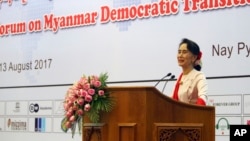The path to democracy is "not a bed of roses," Myanmar's de facto leader Aung San Suu Kyi said Friday at the start of a forum in which the role of the military in the transition to civilian rule looms large.
Speaking in the capital Naypyitaw to open the three-day "Forum on Myanmar Democratic Transition," the Nobel laureate and State Counselor delivered her opening remarks more than 15 months after her party formally took power and amid widespread criticism over her administration's performance.
"When we are trying to change, it is never easy," she said, according to a simultaneous translation. She added that Myanmar can learn from the experiences of other countries that have undergone similar transformations. "To be behind also has some advantages."
Myanmar was ruled by military governments for almost five decades until allies of the former junta launched wide-ranging reforms in 2011, leading to elections in 2015 that Suu Kyi and her National League for Democracy (NLD) won by a landslide.
Hanging over the whole process, however, is the still-powerful military, which continues to clash with armed ethnic groups. Aung San Suu Kyi has eschewed criticism while stressing national reconciliation. She returned to the theme in her remarks on Friday, saying that learning lessons from the past is better than dwelling in it.
The military, known as the Tatmadaw in Burmese, retains significant power due to the 2008 constitution that it drafted. The document guarantees it 25 percent of parliamentary seats and three ministries.
While a portion of the sessions on Friday were devoted to the transition from a military to civilian government, and many of the questions from the audience latched onto the issue, very few members of the armed forces were scheduled to speak.
Real-time events highlighted the tension, as local reports pointed to a possible troop build-up in Rakhine State, where the armed forces have carried out a crackdown on Rohingya Muslim militants since deadly attacks on a police outpost last year. The operations have resulted in numerous claims of human rights abuses.
Historians, politicians, professors and ambassadors, among others, were all scheduled to speak at the forum. Experts who participated in the opening sessions discussed examples of other countries that emerged from outright military or authoritarian rule, including Indonesia, South Korea and, further afield, Spain.
Some of the comments likely will disappoint organizations still seeking redress for years of suffering and hardship under the former Burmese junta, which imprisoned activists and crushed dissent.
Aurel Croissant, a professor of political science at Heidelberg University, said in a talk that efforts in different societies to punish military regimes for past crimes did not end well.
"There isn't a single historical case where this attempt did not lead to disaster," he said. "My advice would be, concluding from the historical evidence, that new democracies may be well advised not to engage under these circumstances in approaches or projects with retributive justice."
Soeren Keil, an Associate Professor at Canterbury Christ Church University who is scheduled to give a talk on Sunday, said in an interview that Myanmar has made substantial progress in recent years, pointing to elections, an increasingly effective parliament, mostly civilian cabinet members, the peace process and media freedoms.
But he said there are still unanswered questions.
"We know where the peace process is supposed to go toward," he said. "But when we look at democratization, I think the whole agenda becomes much more problematic. Because there I can't see a clear goal of saying, this is where we are moving to complete civilian control."
Myanmar is scheduled to again hold elections in 2020, and Keil wondered whether the same constitutional elements keeping the military in power would still be in place.
"That's kind of a date where I think also the NLD itself has to think about what kind of legacy it wants to have for the first five years of power," he said. "And I think that discussion needs to happen."
Myanmar National Security Adviser Thaung Tun, who spoke at the forum, said in an interview on the sidelines that while "there has been a lot of cynicism expressed" regarding the military's role in the transition, "we are working together because we are partners on the same journey."
One of the few members of the military who took part, Col. Aung Myint Oo, the head of the National and International Affairs Department at the National Defense College of the Myanmar Armed Forces, said in a panel discussion that a civilian government may not be able to protect the country against what he described as various threats and problems.
"The military should be a part of one of the organs of the government, and after that we have to negotiate," he said.




